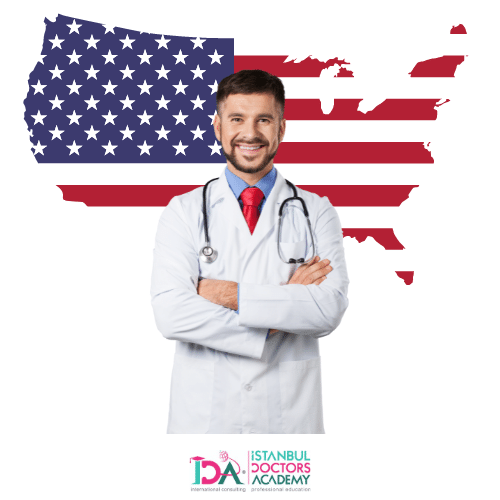About The USMLE
The USMLE, or “United States Medical Licensing Examination”, is a 3-stage exam that everyone who wants to practice medicine in the USA (including those who have graduated from medical schools in the United States) must take.
Priod
5 Month
Per Week
3 Day
Location
Online/Live
Language
English
What is the USMLE Exam?
Opportunity to Become a Medical Doctor in America
The “United States Medical Licensing Examination” is the general name for a series of exams required to apply for state licenses to practice medicine in the United States. Passing the USMLE Step 1, USMLE Step 2 CK and USMLE Step 2 CS exams can be entered on the path to specialization in the USA. The USMLE Step 3 exam, on the other hand, is required to apply for a “full” license, not to enter the specialty path. Fully licensed physicians can apply for an H-1 visa in some states.
The first 2 exams are in Ankara and the third exam is in the USA. The first two exams can also be taken while a medical student. The third exam, step 2-CS, replaces the previously requested TOEFL and measures both your clinical ability and your English.
In order for you to have a successful exam process, you can take the first step by participating in our discounted preparation courses.

For Detailed Information About Usmle Preparation Courses
USMLE Exam Steps

To Benefit From Our Discounted Preparation Courses;
Information About USMLE
The USMLE®, or United States Medical Licensing Examination® program, is owned by two organizations: the Federation of State Medical Boards (FSMB) and the National Board of Medical Examiners® (NBME®).
The FSMB is a nonprofit organization that represents the 70 state medical and osteopathic boards of the United States and its territories. Individual health boards are responsible for licensing doctors, investigating patient complaints, and disciplining doctors who break the law. The FSMB acts on behalf of state board members to provide a national assessment program, provide tools to facilitate the documentation and distribution of identity documents, sponsor a national database for monitoring disciplinary actions, and act as the national voice of individual boards on matters. important for licensing and enforcement.
NBME is a non-profit organization that serves the public through assessments of healthcare professionals. The nearly 80-member board includes representation from national experts who have contributed to the design of their exams, general members who bring a variety of perspectives, including the public, and representatives from a number of organizations, including the Association of American Medical Colleges (AAMC). ), American Board of Medical Specialties (ABMS), American Medical Association (AMA), Resident and Fellows Section of the AMA, the American Medical Student Association (AMSA), Council of Medical Specialty Societies (CMSS), the Educational Foreign Medical Alumni Commission (ECFMG), FSMB, National Student Medical Association (SNMA), uniformed services, and Department of Veterans Affairs.
NBME develops a range of assessments used at home and abroad in medical education, licensing and certification, and is involved in research and development aimed at advancing medical education and the science of assessment.
The USMLE is governed by a committee that includes members from the ECFMG, FSMB, NBME and the public. This committee is responsible for the overall direction of the program, establishing and approving procedures for scoring and setting the pass/fail standard, and all important policies and procedures.
Members of USMLE testing committees include biomedical scientists, educators, and clinicians from every region of the United States. Nearly all LCME accredited medical schools in the United States have been represented on USMLE testing committees. USMLE testing committee members represent a “national medical school” drawn from medical schools, state medical boards, and clinical practice settings throughout the United States (an annual list of volunteer Committees and Task Forces Directory is available here).
The USMLE was created in response to the need for a single pathway to medical licensure for allopathic physicians in the United States. Before the USMLE, multiple examinations (NBME Parts examination and the Federation Licensing Examination [FLEX]) offered pathways to medical licensure. It would be desirable to establish a system of examinations accepted in each state to ensure that all licensed MDs pass the same assessment standards, regardless of school or country where they were educated. All state boards of health today benefit from a national examination – USMLE for allopathic physicians, COMLEX-USA for osteopathic physicians.
The United States Medical Licensing Examination (USMLE) program supports medical licensing authorities in the United States through its leadership in the development, delivery, and continuous improvement of high-quality assessments throughout physicians’ preparation for practice.
To provide meaningful information to licensing authorities from assessments of physician characteristics, including medical knowledge, skills, values and attitudes important to the delivery of safe and effective patient care.
Involve medical educators and institutions, licensing authority members, and practicing clinicians in the design and development of these assessments.
To ensure fairness and equity to physicians through the highest professional testing standards.
Continue to develop and improve licensing assessments to more accurately and comprehensively evaluate physicians.